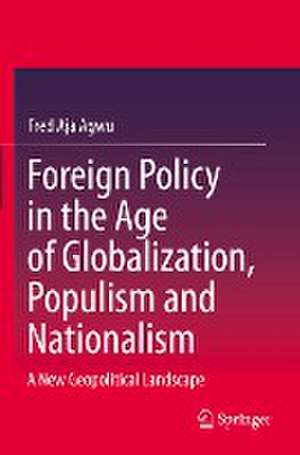Foreign Policy in the Age of Globalization, Populism and Nationalism: A New Geopolitical Landscape
Autor Fred Aja Agwuen Limba Engleză Paperback – 27 iun 2022
| Toate formatele și edițiile | Preț | Express |
|---|---|---|
| Paperback (1) | 957.23 lei 6-8 săpt. | |
| Springer Nature Singapore – 27 iun 2022 | 957.23 lei 6-8 săpt. | |
| Hardback (1) | 962.49 lei 6-8 săpt. | |
| Springer Nature Singapore – 26 iun 2021 | 962.49 lei 6-8 săpt. |
Preț: 957.23 lei
Preț vechi: 1167.36 lei
-18% Nou
Puncte Express: 1436
Preț estimativ în valută:
183.18€ • 189.26$ • 152.38£
183.18€ • 189.26$ • 152.38£
Carte tipărită la comandă
Livrare economică 20 martie-03 aprilie
Preluare comenzi: 021 569.72.76
Specificații
ISBN-13: 9789811633744
ISBN-10: 9811633746
Ilustrații: XXVIII, 485 p. 1 illus.
Dimensiuni: 155 x 235 mm
Greutate: 0.78 kg
Ediția:1st ed. 2021
Editura: Springer Nature Singapore
Colecția Springer
Locul publicării:Singapore, Singapore
ISBN-10: 9811633746
Ilustrații: XXVIII, 485 p. 1 illus.
Dimensiuni: 155 x 235 mm
Greutate: 0.78 kg
Ediția:1st ed. 2021
Editura: Springer Nature Singapore
Colecția Springer
Locul publicării:Singapore, Singapore
Cuprins
1. The paradox of a globalized, populist and nationalist world.- 2. Populism and Nationalism: the making of Brexit and Trumpism.- 3. The sway of populism and nationalism.- 4. Exploding the myth of America as city on the hill.- 5. Lessons from Brexit and Trumpism.- 6. A new geopolitical landscape.- 7. Issues in Sino-Africa relations.- 8. Nigeria and the burden of populism and protectionism in foreign policy.- 9. Nigeria and economic regionalism.- 10. Surviving nationalism, populism, Trumpism and globalization.
Notă biografică
Professor Fred Aja Agwu holds a Bachelor of Science (B.Sc.) Degree in Political Science and Sociology; a Master of International Law and Diplomacy (MILD) and a Doctor of Philosophy (PhD) in International Law. He was the best graduating student in the Faculty of Social sciences at the Anambra State University in 1989; he also wrote one of the outstanding Ph.D. Thesis at the School of Postgraduate Studies, University of Lagos, Akoka, Yaba, Lagos, Nigeria in the 2002 Academic Year. Professor Agwu was the Book Review Editor and later, the Editor of the Nigerian Journal of International Affairs, (NJIA) - the flagship Journal of the NIIA; He is a member of the Editorial Advisory Board of The Nigerian Army Journal. He has also been the Head, Division of International Law and Organization at the Nigerian Institute of International Affairs (NIIA); Acting Director of Research and Studies; and Acting Director-General of the Nigerian Institute of International Affairs, Lagos. In addition to his international conferences and membership in Nigerian delegations to some international organizations, Professor Agwu has taught at the University of Lagos and at various times in some other Nigerian universities as well as being a resource person at the Nigerian Defence College(NDC, Abuja), the Staff and Command College (Jaji), and the Nigerian Army Resource Centre in Abuja. His research interests are in Foreign Policy, the Law of Armed Conflict, and inter-disciplinary areas in public international law and political science.
Textul de pe ultima copertă
This book propounds the thesis that it was the dysfunction of globalization and liberalism that prompted the rise of nationalism and populism. Recent developments in global affairs are challenging assumptions and the basis upon which international relations, as a broad field of specialization, and foreign policy analysis, as a sub-field, rests. In a world that is changing in fundamental and irreversible ways, this book intervenes to enable an improved sense of understanding of these developments and what they mean for people-people, state-state, continent-continent, and global relations, moving forward. The author shows anti-globalization and the growth of nationalism and populism have been particularly necessitated by the failures of liberalism and America’s abdication from the world. With reference to Brexit, the pandemic, the US 2020 elections and consequent shifts in power, with a focus on their respective impacts on Africa, and Africa-Sino relations particularly, and developing countries, more broadly, this book situates these discussions within a global context. It effectively illustrates the insufficiency of the West’s soft power, especially as it is foisted or supposedly imposed on the rest of the world without regard to the demands of cultural relativity. Relevant to postgraduate students, researchers, and policymakers, this is must-read within the fields of international relations and political economy.
Caracteristici
Discusses anti-globalization and the rise of populism and nationalism, identified as three problems that are currently creating angst in the international system
Addresses COVID-19, showing the ineluctability of the world as a global village
Illustrates the insufficiency of the West’s soft power and the disregard for the demands of cultural relativity
Addresses COVID-19, showing the ineluctability of the world as a global village
Illustrates the insufficiency of the West’s soft power and the disregard for the demands of cultural relativity
